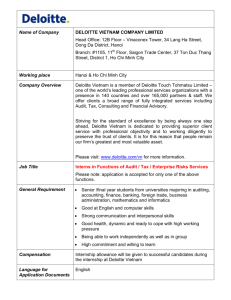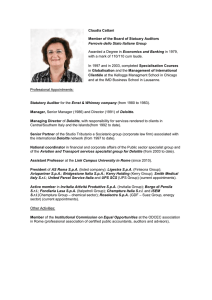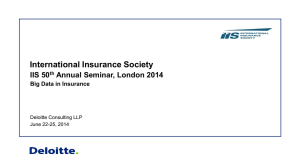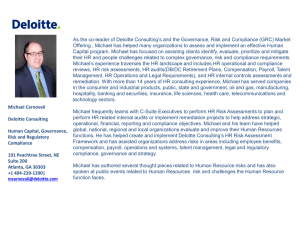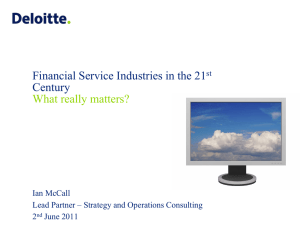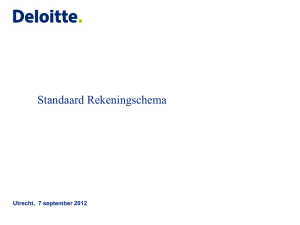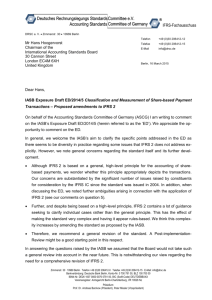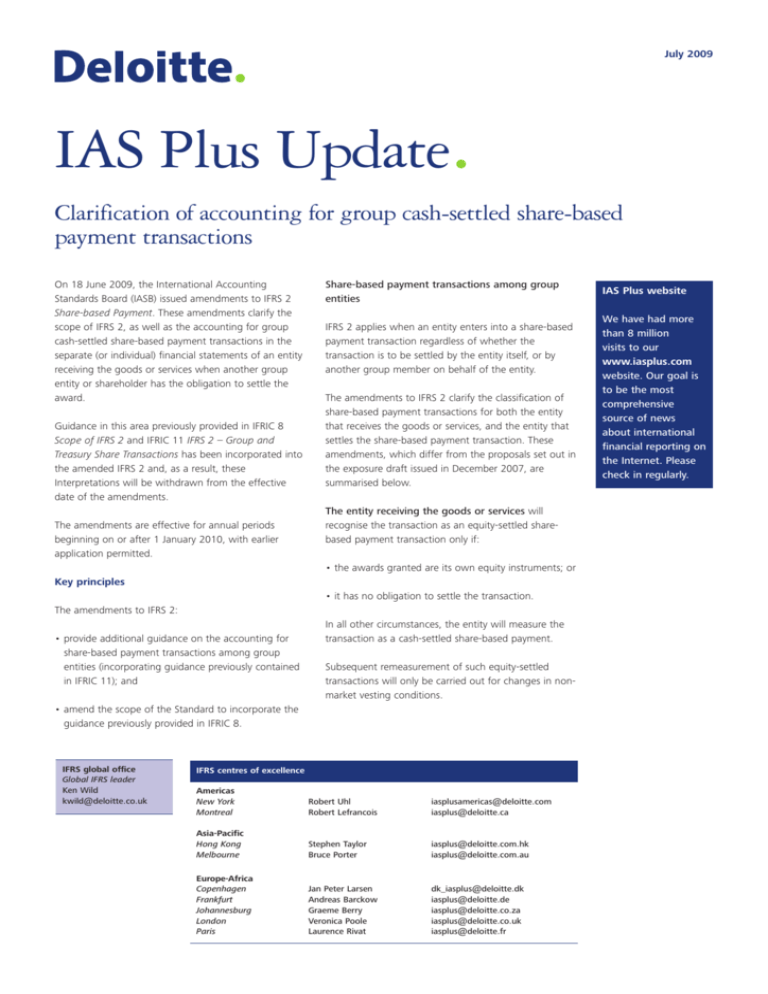
July 2009
IAS Plus Update.
Clarification of accounting for group cash-settled share-based
payment transactions
On 18 June 2009, the International Accounting
Standards Board (IASB) issued amendments to IFRS 2
Share-based Payment. These amendments clarify the
scope of IFRS 2, as well as the accounting for group
cash-settled share-based payment transactions in the
separate (or individual) financial statements of an entity
receiving the goods or services when another group
entity or shareholder has the obligation to settle the
award.
Guidance in this area previously provided in IFRIC 8
Scope of IFRS 2 and IFRIC 11 IFRS 2 – Group and
Treasury Share Transactions has been incorporated into
the amended IFRS 2 and, as a result, these
Interpretations will be withdrawn from the effective
date of the amendments.
The amendments are effective for annual periods
beginning on or after 1 January 2010, with earlier
application permitted.
Share-based payment transactions among group
entities
IFRS 2 applies when an entity enters into a share-based
payment transaction regardless of whether the
transaction is to be settled by the entity itself, or by
another group member on behalf of the entity.
The amendments to IFRS 2 clarify the classification of
share-based payment transactions for both the entity
that receives the goods or services, and the entity that
settles the share-based payment transaction. These
amendments, which differ from the proposals set out in
the exposure draft issued in December 2007, are
summarised below.
The entity receiving the goods or services will
recognise the transaction as an equity-settled sharebased payment transaction only if:
• the awards granted are its own equity instruments; or
Key principles
• it has no obligation to settle the transaction.
The amendments to IFRS 2:
• provide additional guidance on the accounting for
share-based payment transactions among group
entities (incorporating guidance previously contained
in IFRIC 11); and
In all other circumstances, the entity will measure the
transaction as a cash-settled share-based payment.
Subsequent remeasurement of such equity-settled
transactions will only be carried out for changes in nonmarket vesting conditions.
• amend the scope of the Standard to incorporate the
guidance previously provided in IFRIC 8.
IFRS global office
Global IFRS leader
Ken Wild
kwild@deloitte.co.uk
IFRS centres of excellence
Americas
New York
Montreal
Robert Uhl
Robert Lefrancois
iasplusamericas@deloitte.com
iasplus@deloitte.ca
Asia-Pacific
Hong Kong
Melbourne
Stephen Taylor
Bruce Porter
iasplus@deloitte.com.hk
iasplus@deloitte.com.au
Europe-Africa
Copenhagen
Frankfurt
Johannesburg
London
Paris
Jan Peter Larsen
Andreas Barckow
Graeme Berry
Veronica Poole
Laurence Rivat
dk_iasplus@deloitte.dk
iasplus@deloitte.de
iasplus@deloitte.co.za
iasplus@deloitte.co.uk
iasplus@deloitte.fr
IAS Plus website
We have had more
than 8 million
visits to our
www.iasplus.com
website. Our goal is
to be the most
comprehensive
source of news
about international
financial reporting on
the Internet. Please
check in regularly.
The entity responsible for settling the transaction will recognise it as an equity-settled share-based payment only
if the transaction is settled in its own equity instruments. In all other circumstances, the transaction will be
recognised by the entity that settles the award as a cash-settled share-based payment.
The guidance incorporated into IFRS 2 can be illustrated for the most commonly occurring scenarios as follows.
Classification
Entity receiving
goods and
services
Obligation to
How is it settled?
settle share-based
payment
transaction
Subsidiary’s
individual financial
statements
Consolidated
financial
statements
Subsidiary
Subsidiary
Equity of the subsidiary
Equity
Equity
Subsidiary
Subsidiary
Cash
Cash
Cash
Subsidiary
Subsidiary
Equity of the parent
Cash
Equity
Subsidiary
Parent*
Equity of the parent
Equity
Equity
Subsidiary
Parent*
Cash
Equity
Cash
* The same classification will result if the settlement obligation lies with the shareholders or another group entity
(e.g. a fellow subsidiary).
As the classification may be different at the subsidiary and parent level, the amount recognised by the entity
receiving the goods or services may differ from the amount recognised by the entity settling the transaction and in
the consolidated financial statements.
Intragroup repayment arrangements will not affect the application of the principles described above for the
classification of group-settled share-based payment transactions.
Amendment of the scope of IFRS 2
The scope of IFRS 2 has been amended to clarify that it applies to all share-based payment transactions, whether
or not the goods or services received under the share-based payment transaction can be individually identified.
Any unidentifiable goods and services are measured on the grant date as the difference between the fair values of
the share-based payment and the identifiable goods and services. This guidance was previously set out in IFRIC 8.
Effective date
The amendments to IFRS 2 arising from the incorporation of the requirements of IFRIC 8 and IFRIC 11 are subject to
the effective date and transitional provisions of the original Interpretations (now withdrawn).
The other amendments to IFRS 2 are to be applied retrospectively for annual periods beginning on or after
1 January 2010 (subject to the transitional provisions in IFRS 2.53-59), with earlier application permitted. If sufficient
information for retrospective application is not available, the entity will reflect in its separate or individual financial
statements the amounts previously recognised in the group’s consolidated financial statements.
For more information on Deloitte Touche Tohmatsu, please access our website at www.deloitte.com
Deloitte provides audit, tax, consulting, and financial advisory services to public and private clients spanning multiple industries.
With a globally connected network of member firms in 140 countries, Deloitte brings world-class capabilities and deep local expertise
to help clients succeed wherever they operate. Deloitte’s 150,000 professionals are committed to becoming the standard of excellence.
Deloitte’s professionals are unified by a collaborative culture that fosters integrity, outstanding value to markets and clients,
commitment to each other, and strength from cultural diversity. They enjoy an environment of continuous learning, challenging
experiences, and enriching career opportunities. Deloitte’s professionals are dedicated to strengthening corporate responsibility,
building public trust, and making a positive impact in their communities.
Deloitte refers to one or more of Deloitte Touche Tohmatsu, a Swiss Verein, and its network of member firms, each of which is
a legally separate and independent entity. Please see www.deloitte.com/about for a detailed description of the legal structure of
Deloitte Touche Tohmatsu and its member firms.
This publication contains general information only and is not intended to be comprehensive nor to provide specific accounting,
business, financial, investment, legal, tax or other professional advice or services. This publication is not a substitute for such
professional advice or services, and it should not be acted on or relied upon or used as a basis for any decision or action that may
affect you or your business. Before making any decision or taking any action that may affect you or your business, you should
consult a qualified professional advisor.
Whilst every effort has been made to ensure the accuracy of the information contained in this publication, this cannot be guaranteed,
and neither Deloitte Touche Tohmatsu nor any related entity shall have any liability to any person or entity that relies on the
information contained in this publication. Any such reliance is solely at the user’s risk.
© Deloitte Touche Tohmatsu 2009. All rights reserved.
Designed and produced by The Creative Studio at Deloitte, London. 31587


